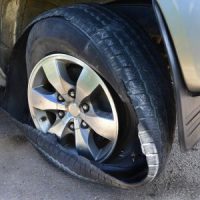Fault for Accidents Caused by Tire Blowouts

Many people are surprised to hear that tire blow-outs are among the most common reasons for truck accidents in the U.S. This makes more sense, however, when you consider how much more wear and tear the tires on these vehicles go through on a day-to-day basis. Read on to learn more about the dangers of truck tire blowouts.
Why are Tire Blowouts Dangerous?
Tire blowouts happen when a vehicle’s tire suddenly bursts or rapidly deflates. Far from being a mere puncture, tire blowouts occur when a tire’s structural integrity is compromised, resulting in an immediate loss of air pressure, making the vehicle a lot more difficult to control. Besides causing a driver to lose control of the vehicle, blown tires can also result in sudden swerving, or even a rollover accident, which makes a collision almost inevitable on Florida’s busy roads. Fortunately, it is possible for those who are injured in accidents that are caused by tire blowouts, to obtain compensation from the parties responsible for the defect.
What Causes Tire Blowouts?
Most tire blowouts are the result of inadequate tire maintenance, such as:
- Worn treads, which make it harder to grip the road, but also weaken the overall stability of the tire;
- Overinflation, which makes tires more susceptible to damage from problems like potholes; and
- Underinflation, which can cause tires to overheat (due to excessive friction) and eventually become destabilized.
Poor maintenance, however, is not the only reason that truck tires are so much more likely to fail. In fact, a tire’s manufacturer could bear responsibility for a tire’s failure and a subsequent accident if it was negligent in designing, manufacturing, or labeling the tire in question. A problem with the materials used to manufacture the tires could, for instance, affect their ability to withstand heat and pressure, increasing the chances of a blowout. Finally, road hazards, like potholes, pose a threat to drivers, as striking these hazards exerts a lot of pressure on tires, which can then burst. Even debris on the road, like a fallen branch or construction material that falls from a truck could pose a risk of a blowout.
Who is Liable for Tire Blowouts?
Who can be held liable for an accident caused by a tire blowout will depend on who was at fault for the tires’ failure. Potentially liable parties could include:
- The trucking company that owns the vehicle, as they are obligated to properly maintain their vehicles, conduct regular inspections, and make repairs when necessary;
- The tire’s manufacturer, if the fault in the tire was caused by a problem with the rubber compound used in production, inadequate sidewall strength, improper belt alignment, or another problem with design or assembly; or
- The government agency responsible for road maintenance if the blowout was caused by a pothole or other road hazard.
For help determining the cause of the blowout that led to your own accident, please reach out to our legal team today.
Schedule a Free Consultation Today
Navigating Florida’s no-fault insurance laws while trying to recover compensation after a blowout-related accident can be difficult. Let us help you with the details of filing your claim while you focus on your physical recovery. Set up a meeting with one of the dedicated Florida truck accident lawyers at Boone & Davis to learn more.
Sources:
fmcsa.dot.gov/sites/fmcsa.dot.gov/files/docs/USDOT_1168_1097_TireAdvisory.pdf
csa.fmcsa.dot.gov/safetyplanner/MyFiles/SubSections.aspx?ch=22&sec=64&sub=143
